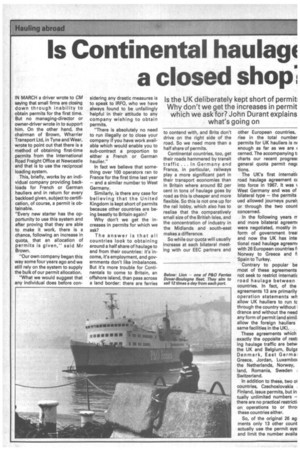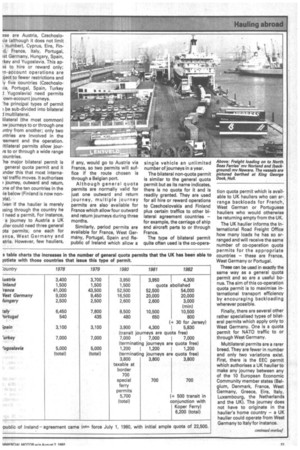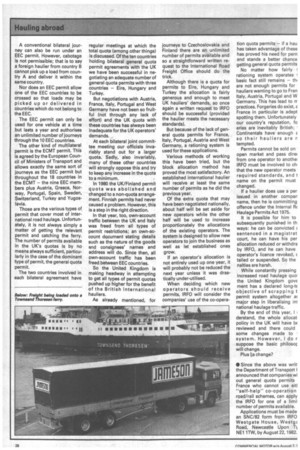s Continental haulagf a closed shopl
Page 22

Page 23

Page 24

If you've noticed an error in this article please click here to report it so we can fix it.
Is the UK deliberately kept short of permit Why don't we get the increases in permit which we ask for? John Durant explains what's going on
IN MARCH a driver wrote to CM saying that small firms are closing down through inability to obtain permits for the first time. But no managing-director or owner-driver wrote in to support him. On the other hand, the chairman of Brown, Wharrier Transport Ltd, in Tyne and Wear, wrote to point out that there is a method of obtaining first-time permits from the International Road Freight Office at Newcastle and that is to use the reciprocal loading system.
This, briefly, works by an individual company providing backloads for French or German hauliers and in return for every backload given, subject to certification, of course, a permit is obtainable.
"Every new starter has the opportunity to use this system and after proving that they are able to make it work, there is a chance, following an increase in quota, that an anocation of permits is given," said Mr Brown.
"Our own company began this way some four years ago and we still rely on the system to supply the bulk of our permit allocation.
"What we would suggest that any individual does before con
sidering any drastic measures is to speak to IRFO, who we have always found to be unfailingly helpful in their attitude to any company wishing to obtain permits.
"There is absolutely no need to run illegally or to close your company if you have work available which would enable you to sub-contract a proportion to either a French or German haulier."
In fact we believe that something over 100 operators ran to France for the first time last year — and a similar number to West Germany.
Similarly, is there any case for believing that the United Kingdom is kept short of permits because other countries are being beastly to Britain again?
Why don't we get the increases in permits for which we ask?
The answer is that all countries look to obtaining around a half share of haulage to and from their countries: it's income, it's employment, and governments don't like imbalances. But it's more trouble for Continentals to come to Britain, an offshore island, than pass across a land border: there are ferries to contend with, and Brits don't drive on the right side of the road. So we need more than a half share of permits.
Continental countries, too, get their roads hammered by transit traffic ... In Germany and France, in particular, railways play a more significant part in their transport economies than in Britain where around 82 per cent in tons of haulage goes by road as this is cheaper and more flexible. So this is not one up for the rail lobby, which also has to realise that the comparatively small size of the British Isles, and the concentration of industry in the Midlands and south-east makes a difference.
So while our quota will usually increase at each bilateral meeting with our EEC partners and other European countries, rise in the total number permits for UK hauliers is nt enough as far as we are earned. The accompanying t charts our recent progres: general quota permit negc Cons.
The UK's first internatic road haulage agreement c• into force in 1967. It was r West Germany and was of bilateral type — the permits ued allowed journeys pure!) or through the two count concerned.
In the following years rr and more bilateral agreemt were negotiated, mostly in form of government treal and now the UK has inte tional road haulage agreemt with 26 European countries f; Norway to Greece and lc; Spain to Turkey.
Contrary to popular be most of these agreements not seek to restrict internatic road haulage between countries. In fact, of the agreements 13 are primarily operation statements wh allow UK hauliers to run tc through the country without I drance and without the need any form of permit (and simil; allow the foreign hauliers same facilities in the UK).
These agreements which exactly the opposite of rest ing haulage traffic are betw; the UK and Belgium, Bulge Denmark, East Germa; Greece, Jordan, Luxembot the Netherlands, Norway, land, Romania, Sweden ; Switzerland.
In addition to these, two 01 countries, Czechoslovakia ; Finland, issue permits, but in tually unlimited numbers — there are no practical restrict; on operations to or thro; these countries either.
So, of the original 26 ag; ments only 13 other count actually use the permit sysi and limit the number availa
a se are Austria, Czechoslocia (although it does not limit number), Cyprus, Eire, Find, France, Italy, Portugal, Ist Germany, Hungary, Spain, rkey and Yugoslavia. This ap3S to hire or reward only; 'n-account operations are )ject to fewer restrictions and y five countries (Czechoslocia, Portugal, Spain, Turkey I Yugoslavia) need permits own-account journeys.
he principal types of permit be sub-divided into bilateral I multilateral.
Materal (the most common) nv journeys to or through one Jntry from another; only two intries are involved in the .eement and the operation. Iltilateral permits allow jourrs to or through a wide range :ountries.
he major bilateral permit is general quota permit and it Jnder this that most internalel traffic moves. It authorises journey, outward and return, )ne of the ten countries in the Ile below (Finland is now nonyta).
iven if the haulier is merely ;sing through the country he I need a permit. For instance, a journey to Austria a UK Jlier could need three general ota permits; one each for ance, West Germany and stria. However, few hauliers, if any, would go to Austria via France, so two permits will suffice if the route chosen is through a Belgian port.
Although general quota permits are normally valid for just one outward and return journey, multiple journey permits are also available for France which allow four outward and return journeys during three months.
Similarly, period permits are available for France, West Germany, Portugal, Spain and Republic of Ireland which allow a single vehicle an unlimited number of journeys in a year.
The bilateral non-quota permit is similar to the general quota permit but as its name indicates, there is no quota for it and is readily granted. They are used for all hire or reward operations to Czechoslovakia and Finland plus certain traffics to other bilateral agreement countries for example, the carriage of ship and aircraft parts to or through France.
The type of bilateral permit quite often used is the co-opera tion quota permit which is available to UK hauliers who can arrange backloads for French, West German or Portuguese hauliers who would otherwise be returning empty from the UK.
The UK haulier informs the International Road Freight Office how many loads he has so arranged and will receive the same number of co-operation quota permits for the appropriate countries these are France, West Germany or Portugal.
These can be used in exactly the same way as a general quota permit and so are a useful bonus. The aim of this co-operation quota permit is to maximise international transport efficiency by encouraging backloading wherever possible.
Finally, there are several other rather specialised types of bilateral permits which apply only to West Germany. One is a quota permit for NATO traffic to or through West Germany.
Multilateral permits are a rarer breed. They are fewer in number and only two variations exist. First, there is the EEC permit which authorises a UK haulier to make any journey between any of the 10 European Economic Community member states (Belgium, Denmark, France, West Germany, Greece, Eire, Italy, Luxembourg, the Netherlands and the UK). The journey does not have to originate in the haulier's home country a UK haulier could operate from West Germany to Italy for instance. A conventional bilateral journey can also be run under an EEC permit. However, cabotage is not permissible; that is to say a foreign haulier from country B cannot pick up a load from country A and deliver it within the same country.
Nor does an EEC permit allow one of the EEC countries to be crossed so that loads may be picked up or delivered in countries which do not belong to the EEC.
The EEC permit can only be used for one vehicle at a time but lasts a year and authorises an unlimited number of journeys through the 10 EEC countries.
The other kind of multilateral permit is the ECMT permit. This is agreed by the European Council of Ministers of Transport and allows exactly the same sort of journeys as the EEC permit but throughout the 18 countries in the ECMT — the nine EEC members plus Austria, Greece, Norway, Portugal, Spain, Sweden, Switzerland, Turkey and Yugoslavia.
Those are the various types of permit that cover most of international road haulage. Unfortunately, it is not always simply a matter of getting the relevant permit and catching the ferry. The number of permits available in the UK's quotas is by no means always sufficient, particularly in the case of the dominant type of permit, the general quota permit.
The two countries involved in each bilateral agreement have regular meetings at which the total quota (among other things) is discussed. Of the ten countries holding bilateral general quota permit agreements with the UK we have been successful in negotiating an adequate number of general quota permits with three countries — Eire, Hungary and Turkey.
But negotiations with Austria, France, Italy, Portugal and West Germany have not been so fruitful (not through any lack of effort) and the UK quota with these countries has always been inadequate for the UK operators' demands.
At each bilateral joint committee meeting our officials invariably stand out for a larger quota. Sadly, also invariably, many of these other countries will strongly oppose this and try to keep any increase in the quota to a minimum.
In 1980 the UK/Finland permit quota was abolished and changed to a non-quota arrangement. Finnish permits had never caused a problem. However, this is a step in the right direction.
In that year, too, own-account traffic between the UK and Italy was freed from all types of permit restrictions; an own-account document stating details such as the nature of the goods and consignees' names and address will do. Since then, all own-account traffic has been freed between EEC countries.
So the United Kingdom is making headway in attempting to get all types of permit quotas pushed up higher for the benefit of the British international hauliers.
As already mentioned, for journeys to Czechoslovakia and Finland there are an unlimited number of permits available and so a straightforward written request to the International Road Freight Office should do the trick.
Although there is a quota for permits to Eire, Hungary and Turkey the allocation is fairly generous and enough to meet UK hauliers' demands, so once again a written request to IRFO should be successful (provided the haulier meets the necessary standards).
But because of the lack of general quota permits for France, Italy, Portugal, Austria and West Germany, a rationing system is used for these applications.
Various methods of working this have been tried, but the block allocation method has proved the most satisfactory. An established international haulier will receive at least the same number of permits as he did the previous year.
Of the extra quota that may have been negotiated nationally, about half will be set aside for new operators while the other half will be used to increase proportionately the allocations of the existing operators. The system is designed to allow new operators to join the business as well as let established ones grow.
If an operator's allocation is not entirely used up one year, it will probably not be reduced the next year unless it was drastically under-utilised.
When deciding which new operators should receive permits, IRFO will consider the companies' use of the co-opera tion quota permits — if a hau has taken advantage of these has proved his need for pem and stands a better chance getting general quota permits
No matter how fairly 1 rationing system operates 1 basic fact still remains — thi are not enough permits for hauliers wanting to go to Fran Italy, Austria, Portugal and W Germany. This has lead to npractices. Forgeries do exist, a France in particular is adept spotting them. Unfortunately our country's reputation, fo eries are inevitably British; Continentals have enough a so their hauliers are n tempted.
Permits cannot be sold on• open market and pass dire( from one operator to anothei IRFO must be involved to chi that the new operator meets required standards, and t name on the permit must changed.
If a haulier does use a per issued in another compan name, then he is committing offence under the Internal IR( Haulage Permits Act 1975.
It is possible for him to subsequently punished in th ways: he can be convicted E sentenced in a magistrat court, he can have his per allocation reduced or withdra by IRFO, and he can have operator's licence revoked, c tailed or suspended. So the nalties are harsh.
While constantly pressing increased road haulage quoi the United Kingdom gave ment has a declared long-t€ objective of scrapping t permit system altogether a: major step in liberalising ml national haulage traffic.
By the end of this year, I derstand, the whole allocat policy in the UK will have IN reviewed and there could some changes made to system. However, I do r suppose the basic philosor will change.
Plus a change?
• Since the above was writ the Department of Transport t announced that companies wi out general quota permits France who cannot use eitl "self-help" co-operation road/rail schemes, can apply the IRFO for one of a limii number of permits available.
Applications must be made an SNC/82 form from IRFO Westgate House, Westga Road, Newcastle Upon 1), NE1 1TW, by August 22,1982.






















































